The Complexities of Family Roles in Long-Term Care
Family involvement plays a crucial role in the mental health of seniors in long-term care facilities. While supportive family relationships can enhance emotional well-being, conflicts and disagreements often contribute to psychological distress among elderly residents and their caregivers. This article explores how family conflicts influence mental health outcomes, the factors that exacerbate these conflicts, and strategies for managing familial disagreements to promote a healthier environment for aging individuals.
Understanding the Impact of Family Involvement on Elderly Mental Health
How does family involvement affect elderly mental health?
Family involvement plays a vital role in shaping the mental well-being of older adults. When family members maintain positive and supportive relationships, they create an environment of emotional safety and belonging. Such connections foster social participation, which is essential in combating loneliness and social isolation—major risk factors for mental health conditions among seniors.
Active family engagement ensures continuity of care, encouraging older adults to adhere to treatment plans and participate in therapy or community activities. This ongoing support not only helps manage symptoms of mental illnesses such as depression and anxiety but also promotes resilience.
Furthermore, family members often act as advocates and co-therapists, providing psychoeducation about mental health issues. When family involvement is grounded in trust, it can decrease stigma associated with mental illness, making older adults more willing to seek help.
In primary care settings, involving families improves communication between health professionals and patients. Trust-building efforts can lead to better diagnosis accuracy and tailored treatment plans, enhancing overall health outcomes.
In conclusion, strong family relationships and active participation are crucial in supporting mental health among the elderly, helping them maintain dignity, independence, and emotional stability.
The Psychological Toll of Family Conflict for Caregivers and Residents
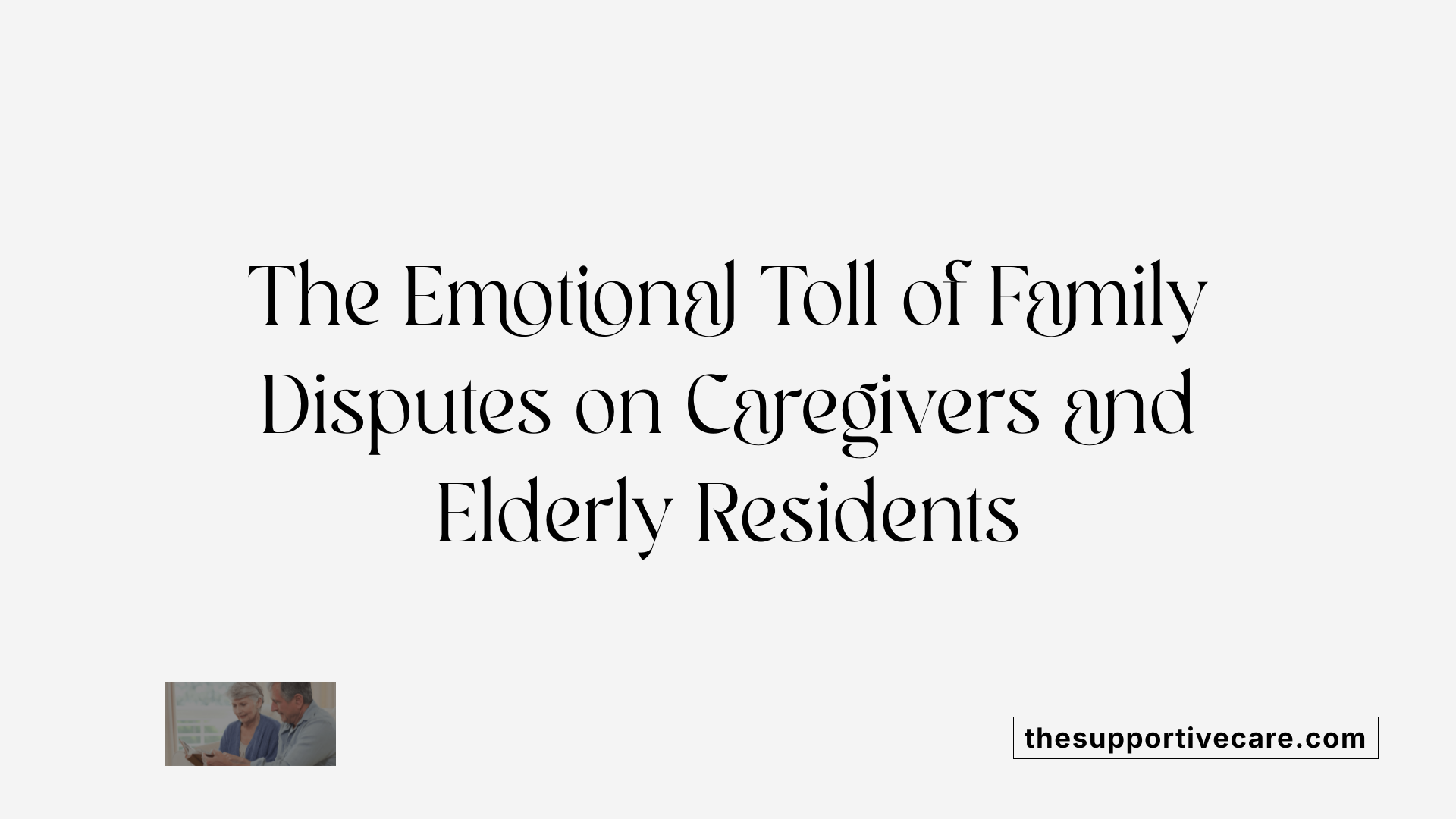
What are some challenges faced by caregivers of elderly individuals in relation to family conflict?
Caregivers often encounter significant emotional and psychological challenges stemming from family disagreements. These conflicts may revolve around differing perceptions of the elder’s needs, decision-making authority, and perceived fairness of caregiving responsibilities. Such disagreements can increase the caregiver’s stress and frustration, sometimes leading to feelings of resentment or burnout. When family members have differing values or expectations, especially regarding the level and type of care, it complicates the caregiving process and can strain relationships.
In addition, unresolved conflicts can cause ongoing tension within the family. High conflict density—where family members are interconnected through frequent disputes—intensifies caregivers’ emotional burden. This turmoil can be especially pronounced in families where traditional roles and responsibilities are contested or where communication breakdowns hinder cooperative caregiving.
How do family conflicts during care impact the mental health of caregivers?
Family disagreements during elder care are closely linked to increased psychological distress among caregivers. These conflicts often elevate emotional strain, leading to higher levels of depression and anxiety. Caregivers may feel overwhelmed by the dual pressure of managing caregiving tasks and navigating family disputes. Such ongoing conflict can result in feelings of helplessness, frustration, and emotional exhaustion.
Research suggests that family conflicts contribute to a greater risk of depressive disorders, sleep disturbances, and even substance abuse among caregivers. These issues not only affect their mental well-being but can also impair their physical health, increasing the risk for chronic illnesses. Addressing and resolving family conflicts through open communication, negotiation, and mutual understanding is crucial for alleviating these adverse mental health effects and supporting caregivers' resilience.
Strategies to Mitigate Family Conflict and Support Elderly Mental Well-Being
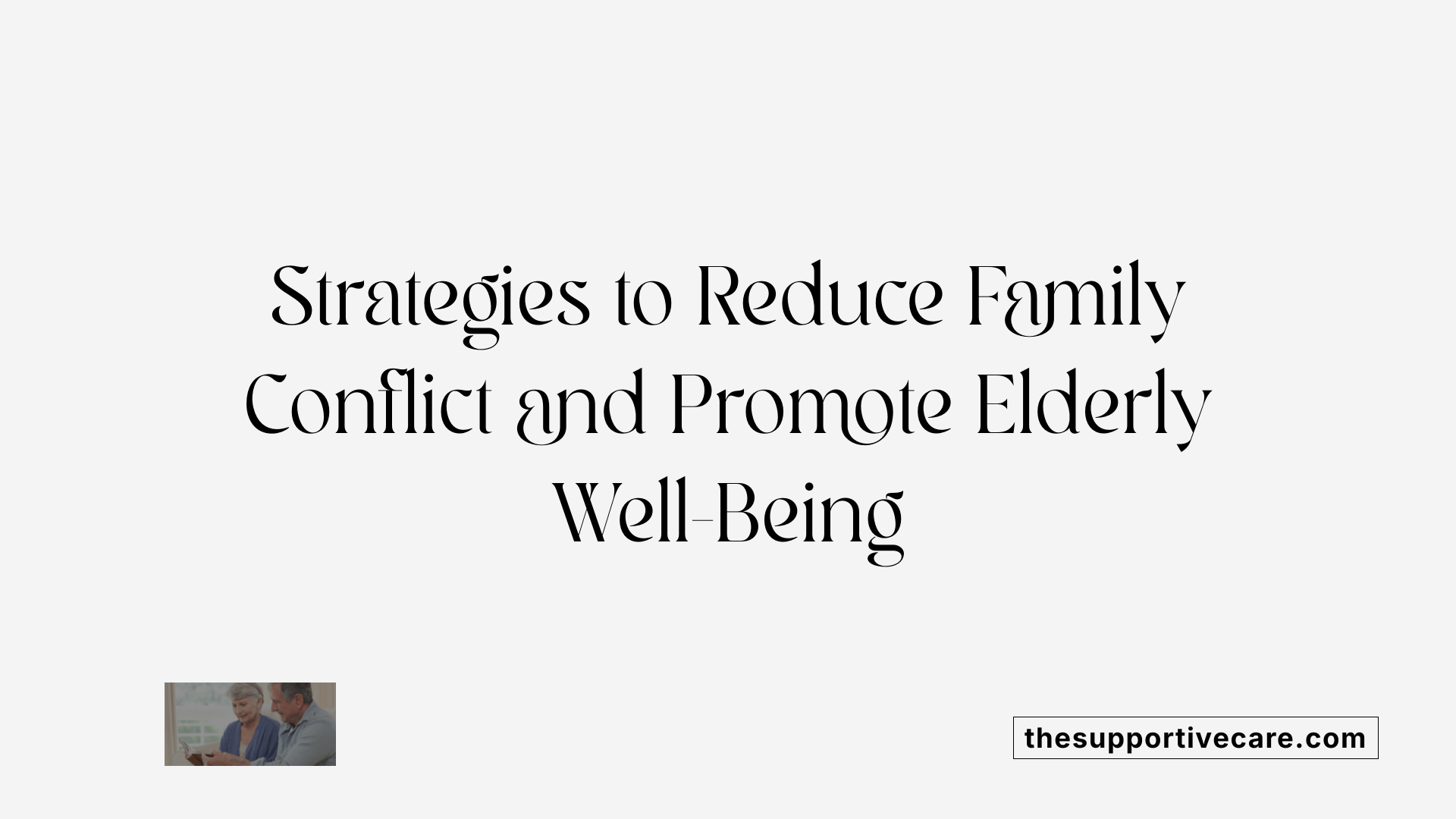
What strategies can help manage family conflicts to promote mental health among seniors?
Family conflicts are common during elder care, often arising from differences in perceptions, values, and roles. To promote mental health and reduce stress, families should prioritize open and honest communication from the outset. Clarifying perceptions of elder care needs and establishing shared understanding are essential steps to prevent misunderstandings.
Implementing conflict resolution skills and involving neutral mediators or professionals can facilitate compromise when disagreements arise. Regular family meetings offer a structured environment for discussing concerns, sharing updates, and addressing emotional issues.
Clarifying and renegotiating roles within the family based on each member’s abilities and availability helps foster fairness and reduce feelings of resentment or burden. Additionally, setting realistic expectations about caregiving impacts allows family members to better plan and manage stress.
Supporting emotional needs through social engagement or connecting with external support networks can also alleviate loneliness and promote well-being. Overall, these strategies create a more collaborative environment that maintains the elder's dignity while safeguarding the mental health of caregivers.
Factors Influencing the Severity of Family Conflict's Impact on Senior Mental Health
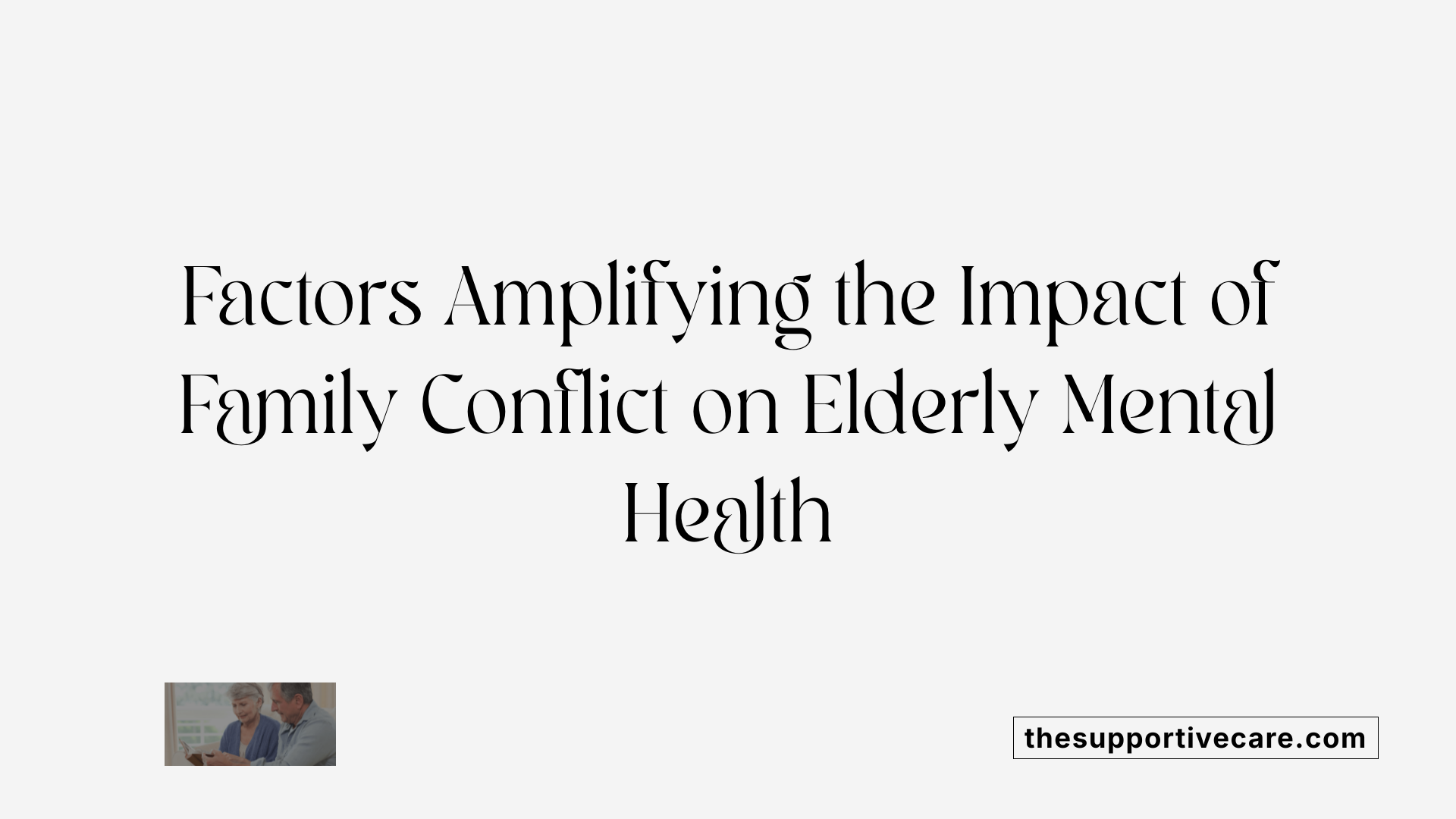
What factors influence the severity of family conflict impacts on senior mental health?
The intensity of family conflict's effect on an elder’s mental health is shaped by several interconnected factors. One crucial element is the overall quality of family relationships, where high conflict density—meaning frequent and interconnected disagreements among multiple family members—can lead to increased psychological distress. When conflict is centralized around a key family figure or across the network (measured by betweenness centrality), the impact on mental health tends to be more severe.
The makeup of the family network also influences conflict levels. Networks including a partner or children often experience more frequent or intense disagreements, especially when roles are unclear or expectations differ. Conversely, families involving more voluntary kin, such as friends or community members, may encounter less conflict, fostering better support and less stress.
Family support and broader social factors also modulate the effects of conflict. When family members communicate openly, manage expectations, and share caregiving responsibilities fairly, the negative impact on mental health decreases. Conversely, unresolved conflicts, perceived intrusion, or controlling behaviors lead to resentment and emotional strain.
Other exacerbating issues can worsen the effects of conflict. Abuse or neglect, social isolation, and the loss of loved ones compound stress levels. These factors may trigger or deepen issues like depression and anxiety in elders.
In summary, the severity of family conflict's impact hinges on the structure and dynamics of relationships, the family network composition, and external stressors. Maintaining healthy communication, reducing conflict density, and addressing issues like abuse or loneliness are vital in safeguarding elder mental health in caregiving situations.
Psychological and Emotional Ramifications of Family Disputes in Elder Care
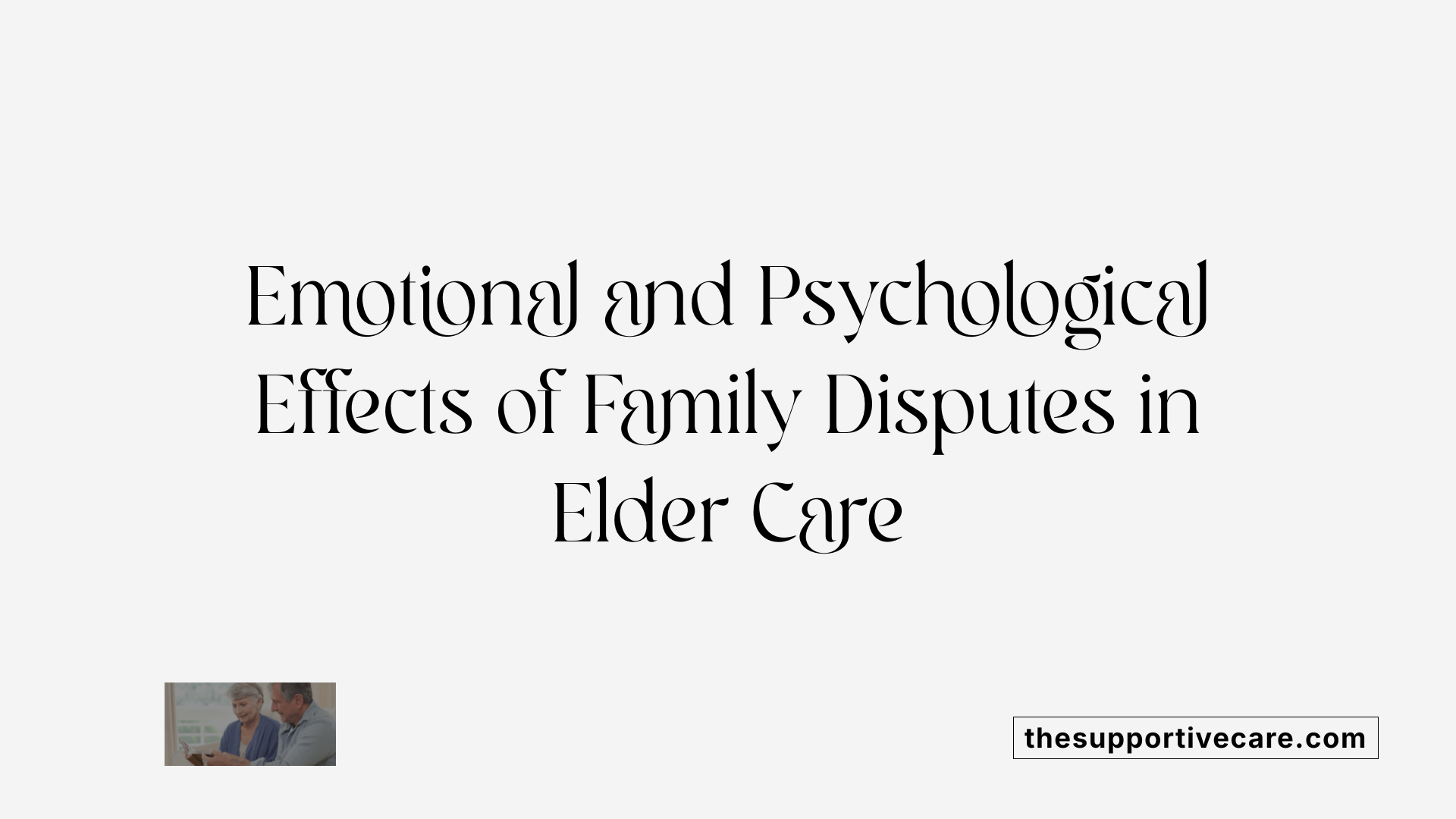
What are the emotional and psychological implications of family conflict for elderly residents?
Family disputes in elder care settings can have profound effects on residents’ mental health. When conflicts remain unresolved, they often lead to heightened feelings of distress, anxiety, and depression among older adults.
Persistent disagreements and misunderstandings can result in social withdrawal, feelings of helplessness, and loneliness. These emotional states are particularly detrimental because loneliness and social isolation are recognized as significant risk factors for mental health conditions like depression and cognitive decline.
For caregivers involved in ongoing conflicts, the emotional toll can be equally severe. Chronic stress and emotional exhaustion may lead to burnout and reduce the quality of care provided.
Transitions, such as moving a loved one into a nursing home, can temporarily lessen direct family conflicts. However, these periods may also evoke feelings of grief, loss, and isolation for caregivers and residents alike.
To mitigate these negative effects, implementing supportive communication strategies and encouraging social engagement can help build resilience among elderly residents. Addressing family conflicts proactively with mediation and counseling can improve emotional well-being and promote a more peaceful caregiving environment.
Effects of Family Conflict within Long-Term Care Environments on Elderly Mental Health
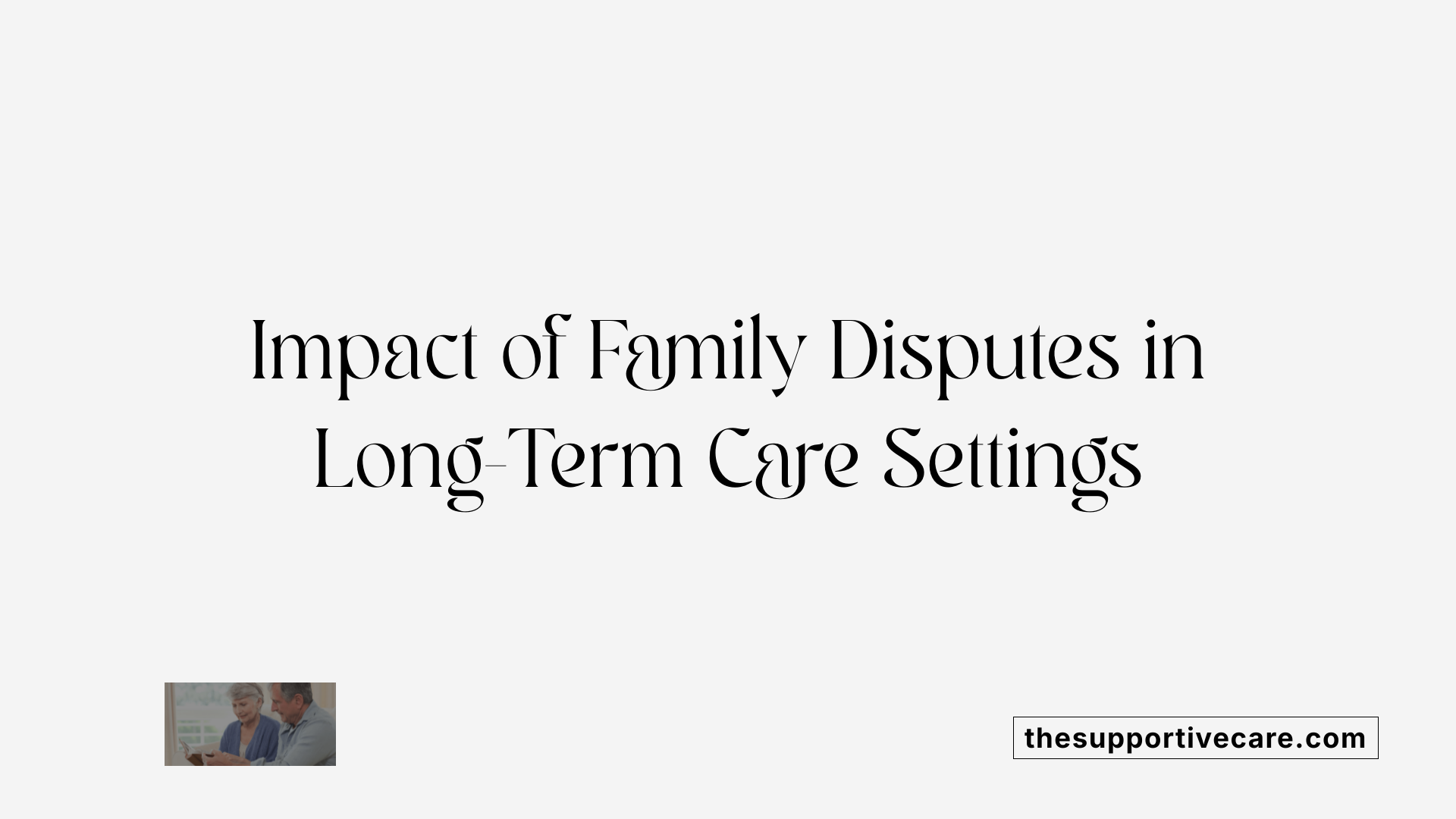
What are the effects of family conflict in long-term care environments on senior mental health?
Family conflicts in long-term care settings can have a profound impact on the mental health of elderly residents. Such conflicts often lead to increased emotional distress, heightening feelings of loneliness and depression among residents. When disagreements or misunderstandings persist, they can undermine a resident’s sense of security and personal dignity, especially during sensitive moments like hospital transfers or approaching the end of life.
Unresolved disputes and strained family relationships may also contribute to behavioral issues in residents, such as agitation or resistance to care. During the COVID-19 pandemic, visitation restrictions made it more challenging for families to engage in positive communication, sometimes intensifying conflicts or feelings of abandonment.
On the other hand, families that demonstrate trust and effective communication tend to foster better outcomes. Supportive family involvement has been linked to fewer behavioral disturbances and lower depression levels. Encouraging family participation, clarifying roles, and resolving conflicts amicably are essential strategies to maintain and improve residents' mental health.
Overall, managing family conflicts with sensitivity and aiming for inclusive, respectful relationships can significantly enhance the emotional well-being of the elderly in long-term care facilities.
The Connection Between Family Conflict and Elderly Mental Well-Being
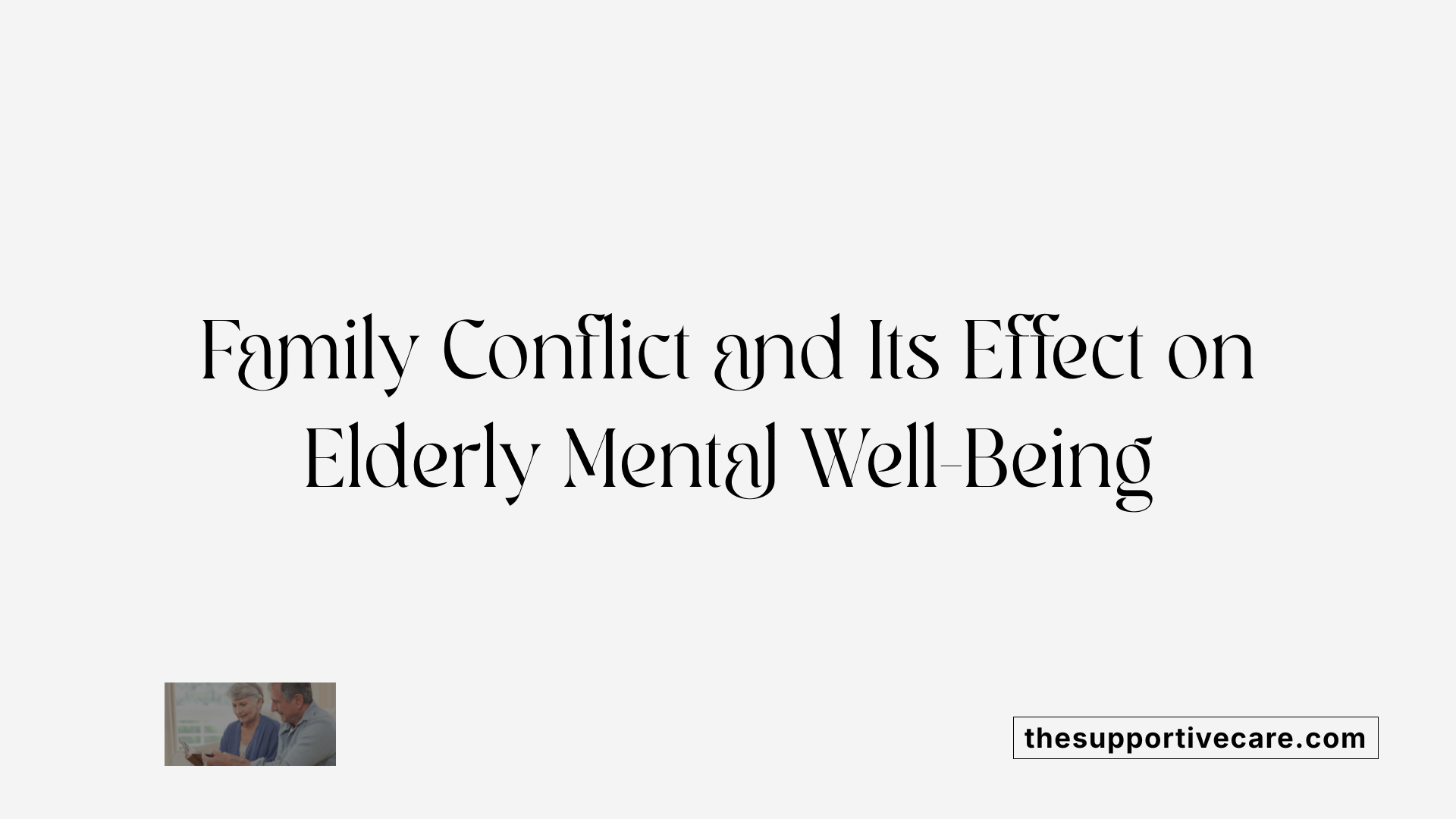
How does family conflict impact mental health in the elderly?
Family conflicts during elder care can have profound effects on an older adult’s mental health. When disagreements or unresolved issues persist, they increase stress levels, which can lead to heightened anxiety and depression among seniors.
Research indicates that families often experience conflicts over various issues, including defining care needs, decision-making, and differing values or beliefs. These disagreements can create a tense environment, making it difficult for elderly individuals to feel safe and supported.
The emotional toll of ongoing familial discord can result in feelings of helplessness and hopelessness. This sense of social and emotional isolation not only worsens mental health but can also exacerbate physical health problems.
Older adults involved in frequent family disputes are more susceptible to mental health conditions such as depression, anxiety, and even post-traumatic stress disorder (PTSD). Verbal, emotional, or physical abuse within the family setting further intensifies these issues, undermining the elder’s emotional stability.
Family conflicts often lead to increased emotional distress that can be persistent and difficult to treat. They may also cause older adults to withdraw from social interactions, reinforcing feelings of loneliness and helplessness. Such dynamics contribute to a cycle where mental health deterioration makes conflict resolution harder, further eroding well-being.
To better understand the complex impacts of family conflict on seniors’ mental health, consider the following table:
| Aspect | Impact | Details |
|---|---|---|
| Stress and Anxiety | Elevated levels | Ongoing conflicts increase cortisol and stress hormones, heightening anxiety. |
| Depression | Feelings of hopelessness | Persistent discord diminishes mood, leads to social withdrawal. |
| Social Isolation | Feelings of helplessness | Conflicts may lead to distancing from family members, reducing social support. |
| Emotional Stability | Reduced resilience | Continuous disputes diminish self-esteem and emotional coping capacity. |
Strategies for managing family conflict
Addressing family conflict involves clear communication, conflict resolution skills, and sometimes professional mediation. Families are encouraged to clarify perceptions of problems and work collaboratively towards mutually acceptable solutions.
Open discussions about roles, responsibilities, and caregivers’ limitations can reduce misunderstandings and resentment. Recognizing and respecting differing values and beliefs is crucial for making decisions that honor the elder’s preferences.
Renegotiating roles and expectations helps distribute caregiving responsibilities evenly, preventing burnout and emotional exhaustion. Improving family communication with transparency and empathy supports more cohesive caregiving.
Moreover, intervention strategies such as family counseling or involving social workers can help resolve conflicts and improve emotional health among seniors.
By fostering understanding and cooperation within the family, it is possible to create a supportive environment that enhances mental well-being while reducing conflict-related stress.
Creating Supportive Family Environments for Aging Populations
Understanding the profound impact of family conflict on the mental health of elderly individuals in long-term care underscores the need for proactive conflict resolution and supportive family relationships. Effective communication, clarifying roles, and addressing social and emotional needs can mitigate the negative effects of conflict. Caregivers and families should seek strategies such as mediation, social engagement, and mental health support to foster resilience and emotional well-being. When family relationships are nurtured and conflicts managed constructively, seniors are more likely to experience improved mental health, dignity, and quality of life in their later years.
References
- Physical and Mental Health Effects of Family Caregiving - PMC
- Re-Imagining Family Involvement in Residential Long-Term Care
- Understanding the Impact of Family Conflict on Senior Care
- The impact of a partner's nursing home admission on individuals ...
- Mental Health in Nursing Homes | Learn Why it is Important
- How to support aging parents and address potential conflicts
- Mental health of older adults - World Health Organization (WHO)


































































































